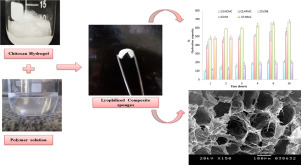In the course of application and modernization of buccal dosage forms, lyophilized sponges for transmucosal drug delivery symbolize one of the most attractive approaches. Chitosan (CS) has been
extensively investigated as a forming material of different buccal dosage forms including sponges. However, CS-based buccal delivery systems suffer from many limitations like weak adhesion strength
and poor tensile properties. So, for the first time, the current study focused on the polymer blending approach to enhance the mucoadhesive properties of buccal CS-based composite sponges. Composite
sponges were prepared using lyophilization technique. Thorough in-vitro characterization of the proposed sponges was performed including mechanical strength determination, Fourier transform infrared
spectroscopic analysis (FT-IR), surface pH, % moisture content, water uptake capacity, viscosity and % porosity assessments. Furthermore, the surface topology of selected sponges was viewed using
scanning electron microscope. The mucoadhesive properties of sponges were tested both ex-vivo and in-vivo. Among all fabricated sponges, sponges fabricated of CS:HPMC (1:1) showed the best
physicochemical characteristics suitable for buccal applications. Incorporation of HPMC into CS-sponges significantly enhanced the mucoadhesion time to 6 h, while CS-sponges lost contact after around
10 min. Preliminary stability study showed CS:HPMC sponges stored in low humidity conditions maintain their soft texture and mucoadhesive properties for one month.

